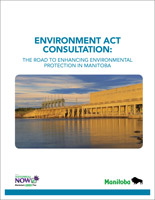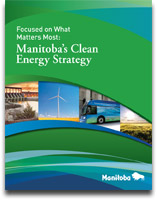
Governments
Manitoba
Environment Act Review - Manitoba Wildlands Responds Two reviews of the Manitoba Environment Act, proclaimed during the election writ after the Pawley government fell in 1988, are ongoing in Manitoba.
Two reviews of the Manitoba Environment Act, proclaimed during the election writ after the Pawley government fell in 1988, are ongoing in Manitoba.The Manitoba Law Reform Commission was directed to review the Act in late 2013. Their review included a discussion paper no longer available, one public event, and a series of in person in depth interviews with Manitobans who have interacted with the law in various capacities. Manitoba Conservation and Water Stewardship (MCWS) also issued a discussion paper, and solicited review comments. The paper is posted in the online public registry. The folder on the registry refers to the Environment Act Consultation. To date there is little indication that a consultation will be conducted. Both discussion papers had a specific set of goals, or agenda. MCWS did not hold any focus groups, interviews, workshops or discussions. The goals outlined in the department’s discussion paper are based on faulty assumptions about current environmental conditions in the province. Manitoba Wildlands provided comments which assessed the Environment Act, as it is being applied, identified changes needed, and responded to the two reviews. It was necessary to disclose that our director, Gaile Whelan Enns, was involved in the public policy work to arrive at this Act, and then participated on an advisory committee to see the Act proclaimed. While agreeing with goals to put environmental effects assessment standards into regulation, and do the same for cumulative assessment, Manitoba Wildlands commented on the Intent in the Act that is not being fulfilled. Improving standards for proponents filings are supported by Manitoba Wildlands. Access to information; reviewing hundreds of grandfathered licences, mechanisms to inspect and review licences, change the licence to deal with, for instance, climate change impacts; and stopping ‘minor alteration’ licences are priorities for Manitoba Wildlands. It is our suggestion also that the Intent section of the Act be updated, including to add missing definitions. The risk arising from this process is that a changed Environment Act with numerous amendments will be handled only in the Legislature from this point. Further ‘consultation’ is required, especially about the Classes of Development definitions, and the Clean Environment Commission.
View Manitoba Wildlands Cover Letter, and Recommendations for changes to Manitoba Environment Act Multiple Environment Reviews Summer 2014 The Manitoba NDP government has several public reviews going on during summer 2014. These include park management plans, a peatlands strategy for the province, and the appeal period for the Keeyask generation station licence. The steps for the Lake Winnipeg regulation review hearings are also starting.
The Manitoba NDP government has several public reviews going on during summer 2014. These include park management plans, a peatlands strategy for the province, and the appeal period for the Keeyask generation station licence. The steps for the Lake Winnipeg regulation review hearings are also starting.
Manitoba Wildlands is providing information about these reviews as most have not be announced in a government press release, and others are difficult to find on the government website. See our news item about the two reviews of the Manitoba Environment Act. See links below for information about these current and ongoing reviews. Seven park management plans are under review in the same time line. Manitoba Conservation is working to catch up on the dated or lacking management plans for parks in our province. Caribou River Wilderness Park, Colvin Lake, Neultin Lake, Numaykoos, and Sand Lakes parks are all located in far northern Manitoba. Draft Park Management plans are posted for public comment until September 1, 2014. Nopoming and Manigotagan open houses will be held in September 2014. There is no pubic registry file for the review of these park management plans. Manitoba’s Peatlands Stewardship Strategy was released in early summer 2014, and it is under review until August 1, 2014. There is no information on the Manitoba Conservation website (see links below) as to filing public comments or the end of this public review period. The Peatlands Stewardship and Related Amendments Act passed third reading, and was proclaimed in June 2014, in advance of public review of the Strategy. The webpage for the Act indicates the review of the Strategy ends August 1, 2014. There is no public registry file for this public review. The deadline for appeal of the environment licence for the Keeyask Generation Station is August 2, 2014. Comments are sent to the licensing branch of Manitoba Conservation. The regional cumulative effects assessment (RCEA) of Hydro generation on the Nelson, Burntwood, and Churchill rivers water basin is ongoing. The Manitoba Conservation public registry has a file and page for these materials. The CEC made a recommendation for this RCEA in its Bipole III report to the minister. To date there is no indication if public review of these materials is intended, or whether Manitoba Hydro’s materials will be assumed to be accurate. Manitoba Conservation may in fact have external experts review the data, and information about 40 years of reservoir status for Lake Winnipeg. Affected communities and environmental organizations have stated this effects assessment and review needs to be independent, and conducted by external experts. The Clean Environment Commission (CEC) is planning its hearings and community visits about the Regulation of Lake Winnipeg. The overdue filing from Manitoba Hydro is now due July 31, 2014. The terms of reference for the hearings, contents expected from Manitoba Hydro, etc are on the CEC website. It is expected that public participants, and CEC experts will review Manitoba Hydro’s filing. Materials will be posted by the Clean Environment Commission at the end of July 2014.
View Manitoba Government Tomorrow Now page Manitoba Environment Act Subject of Two Reviews Manitoba Conservation and Water Stewardship recently announced its review of the province’s environment act, with email notices and posting on its pubic registry. A September 30, 2014 deadline has been set for public comments and recommendations about changes to the Act. No press release announced this review to the public. The Director of Licensing under the Environment Act is directing the government’s review of the Act.
Manitoba Conservation and Water Stewardship recently announced its review of the province’s environment act, with email notices and posting on its pubic registry. A September 30, 2014 deadline has been set for public comments and recommendations about changes to the Act. No press release announced this review to the public. The Director of Licensing under the Environment Act is directing the government’s review of the Act.
A short discussion paper is available for review, though comments about updating and improving the Environment Act based on the know how and expertise of citizens can go beyond responding to government recommendations. Manitoba’s Environment Act dates from 1986, but was not proclaimed by the NDP Pawley government before they lost power in 1988. PC Premier Filmon proclaimed the Act. Few amendments have been made to the Act in the 30 years since it was written. Hundreds of installations, plants, mills, and factories in Manitoba were provided ‘grandfathered’ status under the Act, where they do not have an environment licence. Today’s standards in environmental assessment, public access to information, and responsibilities of the proponent for a development are dramatically different. The Manitoba Law Commission has been involved in its review of Manitoba’s Environment Act since late 2013. Starting with a discussion paper and public event in January 2014, the Commission has conducted interviews with organizations and communities who are knowledgeable about the Act, and reviews, proceedings, hearings, and appeals under the Act. Written submissions can be provided to their offices. Their review and decisions on recommendations for the Act will continue through fall 2014 when they will be provided to the government of Manitoba. To date it is not clear how the government of Manitoba will handle recommendations about the future of the Environment Act from two sources: its own bureaucracy, and the respected Law Reform Commission. The results of both reviews will need to be public, and with response to possible amendments and public comments to the Environment Act transparent. To submit comments to Manitoba Conservation use this email address: publicregistry@gov.mb.ca.
View Manitoba Law Reform Commission projects Reality Checks Manitoba Wildlands will be issuing a series of environmental Reality Checks prior to the expected Manitoba fall 2011 election. Each will be assessed based on one issue or question, and public information that is easily available. We will also be providing Reality Checks about environmental promises and commitments made in 1999, 2003, 2007 elections. It should be noted that information about Manitoba's lands and waters, and our environment can be difficult to access.
Manitoba Wildlands will be issuing a series of environmental Reality Checks prior to the expected Manitoba fall 2011 election. Each will be assessed based on one issue or question, and public information that is easily available. We will also be providing Reality Checks about environmental promises and commitments made in 1999, 2003, 2007 elections. It should be noted that information about Manitoba's lands and waters, and our environment can be difficult to access.When Manitoba Wildlands issues a Reality Check we will provide: news item on our website, and any attached documents or charts. Sources of information will be provided. Where the Reality Check concerns previous Manitoba Wildlands news or analysis these will be linked. View the Reality Checks here:
Manitoba's New Clean Energy Strategy Innovation, Energy and Mines Minister Dave Chomiak announced a new energy strategy for Manitoba. What Matters Most: Manitoba's Clean Energy Strategy was released November 20, 2012.
Innovation, Energy and Mines Minister Dave Chomiak announced a new energy strategy for Manitoba. What Matters Most: Manitoba's Clean Energy Strategy was released November 20, 2012."This strategy is all about making energy choices today that will create a stronger economy and a cleaner environment for our future. Is fossil fuel freedom achievable? We're closer than you might think," stated Chomiak. Priorities the Manitoba Government identified in the strategy include:
"We certainly do need to wean ourselves from dependence on fossil fuels. There are both good and not so good aspects to this strategy, but with public input it could have been significantly improved. It is unfortunate this strategy was released without any opportunities for public input," said Manitoba Wildlands Director Gaile Whelan Enns. View November 20, 2012 Government of Manitoba What Matters Most: Manitoba's Clean Energy Strategy (PDF)View November 20, 2012 Government of Manitoba press release View November 22, 2012 Portage Daily Graphic coverage Source: Government of Manitoba
Manitoba Releases New "Green Plan" Manitoba released Tomorrow Now: Manitoba's Green Plan June 15, 2012. The 54 page eight-year strategic plan calls for the subsequent development of new environmental plans, strategies, laws, policies, etc.
Manitoba released Tomorrow Now: Manitoba's Green Plan June 15, 2012. The 54 page eight-year strategic plan calls for the subsequent development of new environmental plans, strategies, laws, policies, etc.The new plan calls for the development of sixteen plans or strategies:
There is no crown lands, parks or protected areas plan included. New laws, regulations, policies and programs called for, include:
The new green plan does not contain a firm target for greenhouse gas emissions. The government failed to meet its previous target — a six per cent drop from 1990 levels by 2012. The number was based on the Kyoto Protocol and enshrined in provincial law. "Before any other targets are concluded, it's absolutely critical that we have a mandatory reporting of emissions," Manitoba Conservation Minister Gord Mackintosh acknowledged, adding: "You can't cut what you can't count." View Tomorrow Now: Manitoba's Green Plan pageView June 15, 2012 Government of Manitoba Press Release View June 15, 2012 Canadian Press coverage View June 15, 2012 Winnipeg Free Press coverage View June 15, 2012 Ducks Unlimited press release View June 15, 2012 Canadian Boreal Initiatives press release View June 16, 2012 Winnipeg Free Press coverage Source: Government of Manitoba, Canadian Press
David Suzuki Foundation Downgrades Manitoba The David Suzuki Foundation (DSF) released "All Over the Map 2012: A Comparison of Provincial Climate Change Plans" on April 11, 2012. This is the fourth time DSF has reviewed provincial climate change plans. Previous assessments were done for 2005, 2006, 2008.
The David Suzuki Foundation (DSF) released "All Over the Map 2012: A Comparison of Provincial Climate Change Plans" on April 11, 2012. This is the fourth time DSF has reviewed provincial climate change plans. Previous assessments were done for 2005, 2006, 2008.Manitoba received a grade of "fair" in the 2012 assessment. During the first DSF assessment in 2005 Manitoba received a grade of "best", but in 2006 that was reduced to "fair" before it was increased to "good" in 2008. "The Manitoba government, for most of the past decade, made some impressive commitments on climate change. ... However, policies to tackle the greatest sources of emissions - from agriculture and road transportation - have been at best voluntary or weak and at worst non-existent. Emissions in those sectors, and in the province as a whole, continue to rise," states the report. The 2012 report ranks Canada's provinces and territories as follows:
Very Good - Quebec, Ontario and British Columbia
Manitoba will be releasing an environmental plan in summer 2012 that may shed some light on intended climate change actions. View April 11, 2012 David Suzuki Foundation reportView April 11, 2012 Postmedia coverage View April 12, 2012 Vancouver Sun coverage View April 12, 2012 Canadian Press coverage View April 13, 2012 Regina Leader Post Source: Suzuki Foundation
New Environment Plan for Manitoba? Manitoba intends to release an environmental strategy covering everything from climate change to recycling in summer 2012.
Manitoba intends to release an environmental strategy covering everything from climate change to recycling in summer 2012."We thought it was important to plan several years out to have a road map, a blueprint to see how we allocated resources as well, so Manitobans know how the pieces fit together," said Manitoba Conservation and Water Stewardship Minister Gord Mackintosh. The announcement was made in the Winnipeg Free Press. No Government of Manitoba press release was issued. Nothing is available on the Conservation and Water Stewardship departmental website. "We hope that the minister means he will be releasing some kind of draft plan for Manitoba's environment this summer - and then have public meetings and review so that Manitobans will have their say. A plan written inside government needs Manitoban input. There are also regulatory matters that need attention. One example is the lack of any environmental assessment regulation in Manitoba." Kristina Hunter, a environment and geography professor at the University if Manitoba's and vice-chairperson of the Manitoba Roundtable on Sustainable Development, said she would love to see the province get more aggressive on urban planning, to encourage the creation of denser, more walkable communities instead of sprawl. "That's a real void, in my estimation," said Hunter. View March 23, 2012 Winnipeg Free Press coverageView March 23, 2012 Green Action Centre coverage Source: Winnipeg Free Press
Audit - Public Registry System in Manitoba
Audit - Manitoba Climate ChangeManitoba Wildlands is auditing the Manitoba government's climate change targets, actions and commitments.Go to the page: Audit - Manitoba Climate Change Budget & Throne Speeches 1999 - 2009 Manitoba Wildlands has assembled contents of Manitoba government Throne (opening a legislative session) and Budget speeches and government releases or backgrounders for those speeches, from fall 1999 through 2009. The categories of commitments, declarations and policies included in the chart are: protected areas, water, energy, climate change, conservation and environment. Each year and issue area is bookmarked in the pdf provided. Manitoba Wildlands has assembled contents of Manitoba government Throne (opening a legislative session) and Budget speeches and government releases or backgrounders for those speeches, from fall 1999 through 2009. The categories of commitments, declarations and policies included in the chart are: protected areas, water, energy, climate change, conservation and environment. Each year and issue area is bookmarked in the pdf provided. Download Manitoba Wildlands report: Manitoba Conservation & Environment Policies/Commitments 1999-2009 Download Manitoba Wildlands report: Manitoba Conservation & Environment Policies/Commitments 1999-2009  (PDF) Updated November 2009 (PDF) Updated November 2009Manitoba Wildlands has also divided the report Manitoba Conservation & Environment Policies/Commitments 1999-2009 into smaller documents containing each specific topic covered. Download Manitoba Wildlands Analysis/Audit - Manitoba Government Policies/Commitments 1999-2009 documents:  Water Water  (PDF) NEW November 2009 (PDF) NEW November 2009  Protected Areas (including analysis) Protected Areas (including analysis)  (PDF) Updated November 2009 (PDF) Updated November 2009 Climate Change Climate Change  (PDF) Updated November 2009 (PDF) Updated November 2009 Energy / Hydro Energy / Hydro  (PDF) Updated November 2009 (PDF) Updated November 2009 Conservation & Environment Conservation & Environment  (PDF) Updated November 2009 (PDF) Updated November 2009 Land & Watershed Planning Land & Watershed Planning  (PDF) Updated November 2009 (PDF) Updated November 2009Manitoba Wildlands also aims to analyze and comment on status and progress regarding these environmental commitments, declarations and policies from the Manitoba government Throne and Budget speeches and associated documentation. The transcripts for these speeches are linked in each report. Manitoba government Throne speeches 1999-2008 (transcripts): 1999 | 2000 | 2001 | 2002 | 2003 | 2004 | 2005 | 2006 | 2007 | 2008 | 2009 | Manitoba Lands, Waters, Environment PoliciesManitoba Wildlands has assembled a listing of Manitoba government lands, waters, and environment policies from fall 1999 through to fall 2010. This listing was first posted January 2006, updated for January 2007, and August 2009. In 2009 a CD product that includes pdf versions of all policies listed became available.As of September 2010 Manitoba Wildlands has updated the policy listing with pdf versions of policies, see below. Updated listing includes some policies from past years, especially with respect to water. Requests for the CD with pdfs of all policies listed can be sent to info@manitobawildlands.org  Download Manitoba Wildlands Listing: Manitoba Government Lands, Waters, and Environment September 2010 Updates Download Manitoba Wildlands Listing: Manitoba Government Lands, Waters, and Environment September 2010 Updates  (PDF) (PDF)  Download Manitoba Wildlands Listing: Manitoba Government Lands and Waters Policy 1999 - August 2009 Download Manitoba Wildlands Listing: Manitoba Government Lands and Waters Policy 1999 - August 2009  (PDF) Updated October 2010 (PDF) Updated October 2010 Download Manitoba Wildlands Listing: Government of Manitoba Public Policy 1999 - 2007 Download Manitoba Wildlands Listing: Government of Manitoba Public Policy 1999 - 2007  (PDF) (PDF)  Download Manitoba Wildlands Listing: Government of Manitoba Public Policy 1999 - 2006 Download Manitoba Wildlands Listing: Government of Manitoba Public Policy 1999 - 2006  (DOC) (DOC)New Democratic Party Statement of Principles
Mines Branch - Acts and Regulations Other Manitoba Acts can be found by clicking here. The Legislative Assembly of Manitoba The Legislative Assembly of Manitoba - Cabinet Ministers Orders in Council Manitoba Statutory Publications 200 Vaughan Street Winnipeg, Manitoba R3C 1T5 Phone: (204) 945-3102 E-mail: statpub@gov.mb.ca |
Canada
Elections
Governments Links,
 2002-2014
2002-2014

